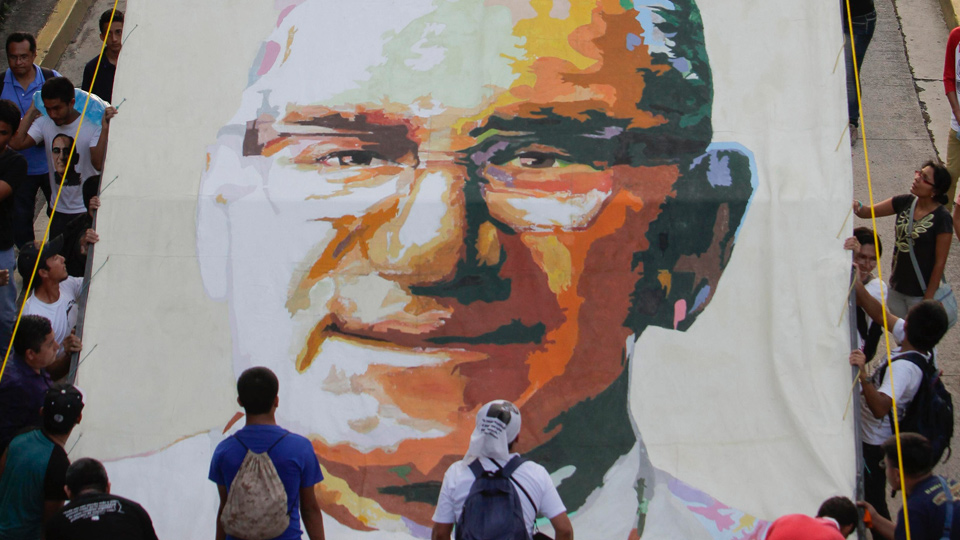Cycle A | Lent | Week 2
REFLECTION
– By Fr Ugo Ikwuka
Archway, London
A man goes to see his doctor and complains, “Doc, I’m really worried. Every time I drink a cup of coffee, I feel a stabbing pain in my eye. Do you think it’s serious?” The doctor replies, “Nope, but try taking the spoon out of your cup.”
The transfiguration experience which took place atop a mountain in this Sunday’s Gospel helped the disciples Peter, James and John to have the right view of Jesus and by implication the correct reading of what the future holds for them. Few days before the incident, Peter had correctly answered on behalf of the others that Jesus is Christ the Messiah, the Saviour King expected by Israel. It must have been an exciting moment for them all; the realization that among all their fellow countrymen, they are the privileged chosen companions of the Messiah. One can imagine them having dreams of power and glory.
However, they were still basking in the euphoria of this good news when Jesus literally killed their joy. He announced that he would soon be arrested and nailed to the cross on which he would eventually die. That shocked the hell out of them. They had left everything to follow Him as the Messiah whom they thought would conquer their enemies and restore the fallen Kingdom of Israel only for him to let them down with such hopeless news. That’s not their vision of the Messiah. What kind of Messiah dies like a common criminal? What’s the point following him then? Is this all there is?
They therefore needed some re-assurance and Jesus rose to the occasion. He took them up through the transfiguration experience where they saw Him transformed in a new light, dazzling, amidst callers from heaven (Moses and Elijah) with the voice of the Father confirming that indeed he is the beloved, the Messiah. It was such an awesome experience that Peter couldn’t help but ask that they remain there. It was the morale booster they needed; the re-assurance that they are on track.

Before then, they had known Jesus only in his external appearance; a man not different from others. They knew where he came from and the tone of his voice. But now, they know better. They know another Jesus; the true Jesus, the one who cannot be seen with the everyday eyes, the one who comes as a gift from the Father.
But, did they really see a new Jesus? Not really. It is still the same good old Jesus but seen now with a purified vision which is possible only from that ‘height’ on which he lifted them; the implication being that we have to rise to a new height, above the prejudices and primitive tendencies that distort our vision in order to have the right view of things in the broader picture.
Looking at the broader picture, they could see that even the death of Jesus, the thought of which had earlier frustrated them, was indeed the gateway to his being the Messiah. As Jesus would note elsewhere, “A grain of wheat remains no more than a single grain unless it drops into the ground and dies” (John 12:24).
Friends, there are times in our lives when looking at our circumstances, we wonder in frustration like the disciples “Is this all there is?” But, the transfiguration experience demonstrates that if we can follow Jesus and rise above our set ways and myopic view of life, we can see the broader picture which holds much more promises from life’s experiences.
Seen in the light of our distorted and encumbered vision, people and things around us may look hopeless, common and sometimes different and repulsive. If we narrowly focus on the “disappointments” of yesterday for instance, we may lose their significance for today. Sometimes it is not until much later in life that we come to see the purpose of the events of our lives and how they all fit together. It is then that we realise how God works through such events to prepare us for the future.
Transfiguration is thus the resolution to the spiritual dryness felt by many. Indeed, our worries are resolved, not by changed circumstances but by changed view of life. We do not need to see new things; we need to see the same old things with new eyes. It is not about seeing new people, but seeing the same old people with new eyes. We do not need to hear a different voice. We need to hear the same old voice with different ears.
We do not need to escape the circumstances of our life. We need to be more fully present to life’s circumstances. When these happen, life is no longer lived at the surface. These are the transfigured moments; moments when the circumstances of our life have become windows into a new world, into a new way of being and we come face to face with the glory of God. Circumstances have not changed. We have changed and that seems to change everything.




